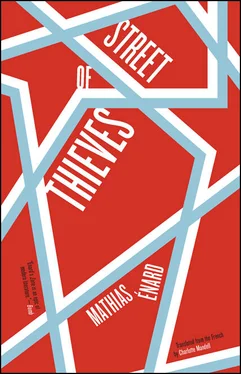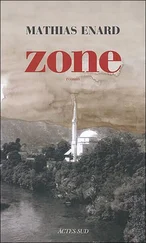I bought some shirts with my back tensed, sensing a catastrophe, without knowing it had already taken place. I attributed my feverishness to the fire, to Judit’s arrival, to the attack and to Bassam’s disappearance, without sensing that the worst was already there; I hesitated for a long time in front of a pair of pajamas, hoping Judit would see me in them; I had a fleeting thought, a little sad all the same, about the only woman who had ever seen me naked, not knowing that she no longer existed.
That evening was one of the longest ever.
Solitude and waiting.
I lingered online to find news, news of anything, of Bassam, of Sheikh Nureddin, of Judit, of the world, of Libya, of Syria. The flames were taller than ever. I went out for a walk; the night was warm, the town was crowded, Tangier could, in the spring, be thrilling and dangerous. Everything had turned against me; the burnt smell lingered in my nostrils and blocked the smell of the sea. Young people were walking in threes, in fours, restlessly, swaying their shoulders; at a bend in the street, I saw a guy my age, half-mad, violently attacking a potted tree, flinging it on the ground and shouting insults, for no reason, before being pummeled in turn by the shop owner, who had burst out of his store — blood splattered onto his white T-shirt, he lifted his hand to his face, seeming stunned, before running away, screaming. I remember, the tree was an orange or lemon tree, it had little white flowers, the owner of the store set it back upright in its pot, stroking it if as it were a woman or a child, I think he even spoke to it.
I was a few yards away from the French bookstore, so I went in; I looked at the shelves a little, those serious books were intimidating, expensive and intimidating, you hesitated to open them for fear of staining the cream-colored covers or damaging the bindings. There was a section on Tangierian literature, and they were all there, the authors Judit had mentioned: Bowles, Burroughs, Choukri of course, but also a Spaniard by the name of Ángel Vázquez, who had written a novel called The Wretched Life of Juanita Narboni —what I was looking for in books was more to forget my own messed-up life, to forget Tangier; I found the “detective novel” section, there were mostly huge books whose size seemed gigantic to me, disproportionate to my old Série Noires gone up in smoke, just as intimidating as the serious novels. I left a little sad at not having found company, an unknown book that had the power to change the course of things, put the world back in order; I felt tiny when faced with real literature. I went down to the sea and thought of Bassam; if he really was an accomplice in the Marrakesh attack, I wondered if I’d ever see him again.
Neon bars winked at me, guys were lounging in deck chairs and basking in the spring weather; they all looked like smugglers. I could never have been so far from my home, even in Barcelona, Paris, or New York; these streets breathed something forbidden in the dangerous night, so far from the neighborhoods of my childhood, so far from that childhood from which I was barely emerging and that the steep alleys reminded me of with their radical difference. I wondered if I would ever dare go into one of those joints with red lights, smelling of cigarettes, desire, and dereliction, if I’d ever be old enough for those places. After all I had some money now, and soon I’d want to have a drink, maybe even talk to someone. I appreciated alcohol for the image it gave me, of a hard, adult male, who fears neither his mother’s anger nor God’s, a character, like the ones I wanted to resemble, the Montales, the nameless detectives, the Marlowes, the private eyes and cops in noir novels. Why do we cling to these images that form us, these examples that shape us and can break us, while at the same time building us up, identity always in motion, forever being shaped, and my loneliness must have been so great that night because I went into a tiny bar called El Pirata, whose brownish sign must have known the glorious era of Tangier’s international status, and the Occupation as well, the boss with straightened hair dyed platinum blonde was watching me and no doubt wondering if I was even old enough to be there. I said hello, sat down at the bar on a stool, ordered a beer. She looked at me as if to scold me, but served me. I wondered what she was thinking, how a young hick like me got there, all alone; maybe she wasn’t imagining anything at all. Barely five minutes later, a girl came out from behind a curtain, she was thin as a whip, bony legs in black stockings, pale cheeks despite her makeup, she hoisted herself up onto the seat next to me, I had entered this joint, you had to follow through; or maybe I had entered precisely for this, to speak with someone, hostess or whore, unlike the characters in my novels I averted my eyes, a little ashamed, her name was Zahra, at least that’s what she said; she had scars on her face, very thin lips, she smelled of jasmine, and beneath the perfume her clothes exhaled the incense of cedar from the room where I let myself be led by the hand ten minutes later, a greenish sofa shiny from use beneath a halogen lamp set to low, Zahra sat down and undid the buttons on her shirt, she wore a white bra whose lace gaped open, revealing her tiny breasts with very dark areolas, she said give me two hundred dirhams, searching through my pocket let me not look at her for an instant, I handed her the money, she put it under one of the couch cushions, she spread her legs and lifted her skirt to show me her sex shaved to its almost black skin, matching the edges of the stockings that covered her bony thighs, I was torn between shame and desire, she motioned me to approach, I didn’t move, she whispered come on, don’t be afraid, she caught my hand to place it on her chest while caressing my crotch, her breath moved up along my belly, she began undoing my belt, I stepped back and pushed her away; she gave me a funny look, finally shame got the upper hand, I went out. The lady behind the bar sniggered “Already?” I didn’t even turn around.
The street was deserted, I was a little disoriented, my heart was pounding. Today was vile. I thought for an instant of Meryem, then of Judit, as I walked to my hotel.
Tomorrow will be another day.
I tried to read For Bread Alone a little, without managing to, the images of Zahra’s sex inserted themselves between the book and me. They remained for a long time in the darkness, long after I had put out the light.
WHENIbn Battuta began his journey, as he was leaving Tangier headed east, in 1335, I wonder if he hoped to return to Morocco one day or if he thought his exile would be absolute. He spent some years in India and the Maldives, in the service of a Sultan who appointed him a Cadi, a judge, no doubt because he was learned and knew Arabic; he even married the Vizier’s daughter. When he left the archipelago, after traveling through a city where women had only one breast, he met a man living alone with his family on a small island, and envied him; he owned, Battuta said, a few coconut palms and a boat he uses to fish and to visit the neighboring islands when he wishes. By God, he says, I envied this man, and if that island had belonged to me, I would have settled on it till the end of my life. He ends up returning to Morocco, and I picture him ending his days in a little monastery for dervishes where he found peace, as he wrote the narrative of his travels, perhaps, or as he recounted to whoever was willing to listen his adventures beyond the seas. I don’t remember any mention of prostitutes in his memoirs as they have reached us; Ibn Battuta had female slaves, singers, and a few legitimate wives he married in the course of his travels. But I confess that later on, in Barcelona, in the midst of whores and thieves, among the smoke of trashcans on fire, amid the truncheons of helmeted police, Zahra’s thin face and her cunt often returned to me like a regret, like one more sadness to add to the list, an ambiguous remorse, what sort of man was I then, my youth thought, if I was incapable of enjoying a woman I had paid for and who was offering me, between her black stockings, her stubbly private parts; more than once I was tempted to slip twenty or thirty euros to the prostitute forever seated on the stoop of the building next to mine, in the Raval, and go upstairs with her just to rediscover a self-respect, a confidence in me that had mostly stayed behind with skinny Zahra and the laughter of her Madam.
Читать дальше












